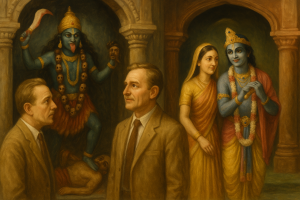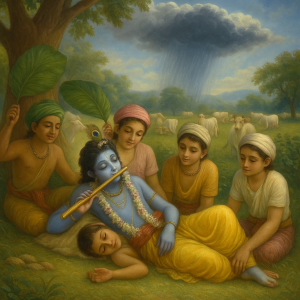In ancient times, the system of education was simple and sacred. The brāhmaṇa teachers would not accept salaries, but would live by śiṣya-pratigraha, the voluntary offerings of their students. Their livelihood was sustained through pathana (learning), pāṭhana (teaching), yajana (worship), yājana (guiding in worship), dāna (giving charity), and pratigraha (accepting gifts).
One such teacher announced the annual śrāddha ceremony in honor of his departed father and requested each student to offer some contribution for the event. One promised cloth, another offered rice, another offered ghee, and so on. But among them was a poor boy who had nothing to give.
With a heavy heart, he said, “Guru Mahārāja, I must ask my mother before promising anything.”
That night, he asked his mother, “Dear Mother, everyone is offering something to Guru Mahārāja. What should I promise?”
His mother, overwhelmed by poverty, gently replied, “My dear child, we have nothing. But there is one hope—Kṛṣṇa is called Dina-bandhu, the friend of the poor. If He desires, He will give. You may ask Him.”
The boy, with innocent simplicity, asked, “Where is this Dina-bandhu?”
The mother replied, “He resides in the forest, they say. Cry out to Him with your heart, and He may respond.”
The next day, the boy went deep into the forest. With great longing, he began calling aloud, “Dina-bandhu Bhai! Dina-bandhu Dādā! Where are You?”
He cried and cried. Seeing the sincerity of the boy’s heart, Kṛṣṇa Himself appeared, adorned with forest flowers and playing His flute. He smiled and asked, “Why are you calling Me?”
The boy folded his hands and said, “Are You Dina-bandhu? My mother told me You are the friend of the poor. Guru Mahārāja is holding a feast, and everyone has promised something. I have nothing. What can I give?”
Kṛṣṇa replied sweetly, “You promise to provide yogurt (dahi). I will take care of it.”
Delighted, the boy ran back to the teacher and announced, “Guru Mahārāja! My Dina-bandhu brother will give all the yogurt needed for the feast!”
The teacher was pleased and accepted the promise.
When the day of the ceremony arrived, the boy again went into the forest and cried out, “Dina-bandhu Dādā!” Kṛṣṇa came and gave him a small clay pot filled with yogurt.
The boy carried it to the teacher with great joy. But the teacher, seeing the small pot, became upset. “So many people will be fed today, and this tiny pot is your contribution?”
In anger, the teacher threw down the pot. It broke and the yogurt spilled, but miraculously, the pot refilled itself.Again he emptied it—and again it filled. Again and again. He was astonished!
Then he understood, “This is not ordinary yogurt. This is Kṛṣṇa’s mercy—Kṛṣṇa-prasāda. This is spiritual!”
As the Upaniṣadic truth declares:
pūrṇasya pūrṇam ādāya, pūrṇam evāvaśiṣyate
“Though the complete Whole is taken from, it remains whole.”
This is the nature of the spiritual world—where subtraction does not diminish, and addition does not increase. In the world of advaya-jñāna (non-dual absolute truth), Kṛṣṇa remains complete, always ready to give to His devotees endlessly.
Lesson to Be Learned
This story teaches us several deep truths of devotional life:
- Kṛṣṇa is truly Dina-bandhu, the ever-merciful friend of the poor and helpless. He is easily accessible to the simple-hearted devotee, not the proud or scholarly.
- The Lord cannot be purchased by wealth or learning, but He is purchased by pure, childlike dependence and śraddhā (faith).
- Even the smallest offering made to Kṛṣṇa, when surrendered in devotion, becomes unlimited, just like His pot of yogurt that never emptied.
- The spiritual world operates beyond material logic. In Kṛṣṇa’s world, 1 – 1 = 1 and 1 + 1 = 1. This is the Absolute Truth, where everything is one in connection with the Lord.
- Serve the Lord with love and dependence, and He will supply all that is needed, often through miraculous ways.
Origin of the Story
Told by Śrīla A.C. Bhaktivedānta Swami Prabhupāda during a lecture on Śrīmad-Bhāgavatam 3.25.38, Bombay, December 7, 1974.
Source: VedaBase® => SB 3.25.38, Lecture, Bombay


